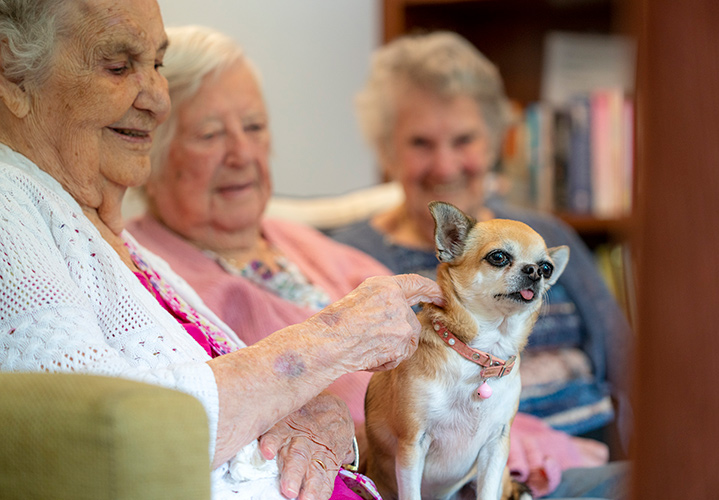
10 top tips to prevent memory slips
Can’t find your car keys? Forget a loved one’s name? You’re not alone. Unfortunately, most of us can get a bit more forgetful with age. While there’s no guarantee you won’t get dementia or some form of cognitive decline, there are several things you can do to try and slow it down.
“There’s no shame in losing your memory,” says Bonnie Robinson, HBH Senior Living CEO. “We should never blame those who get cognitive issues – unfortunately it’s just one of the things that can happen with age and it can happen to anyone. Cognitive decline increases exponentially with age, so the longer you live, the higher your chances of having some degree of it.”
Memory loss has a habit of creeping up slowly, so that we barely notice it happening. “A good analogy is that of the ‘slowly boiling frog’,” says Bonnie. “When a frog is suddenly put into hot water, it will jump out. But if the frog is put into tepid water that is slowly brought to boiling point, it will not perceive the danger. Losing your memory can be similar; you don’t always notice it’s fading away until it’s too late.”
On a more positive note, there are some simple, proactive things you can do to help your brain learn and remember better – and most of them are good for your overall health too. So start sharpening up your mind now by reading our 10 top tips to prevent memory slips…
1. Keep your body moving
Physical activity increases blood flow to your whole body, including your brain, so aim to keep exercising as much as you can. Try to take a walk every day, join a weekly walking group (a great way to enjoy both exercise and company), join a gym or club, or sign up for local exercise classes such as yoga, tai chi, swimming or fitness for seniors.
“Another option is to join a local social network such as Virtual Village East,” says Bonnie. “We aim to help seniors be more proactive about their health and social connections with activities such as regular outings, our Safe & Strong exercise classes, and our weekly walking group – it’s a great way to keep fit and meet people while getting some fresh air.”
2. Keep your brain active too
Just as physical activity helps keep your body in shape, mentally stimulating activities help keep your brain in shape — and might help to keep memory loss at bay. “It’s important to try new challenges to use different parts of the brain,” says Bonnie. “No one said you have to be good at your hobbies – you just have to enjoy them.”
Try doing daily crossword puzzles and quizzes. Watch documentaries and read the paper. Play bridge or chess. Learn to play a musical instrument or even learn a new language. Volunteer at a local hospice shop, school or community organisation – it all helps to keep you and your brain active and stimulated.
3. Stay connected & sociable
Social interaction is proven to help ward off depression and stress, both of which can contribute to memory loss – not helped by the lockdowns and restrictions of the past two years.
“Studies have shown that chronic loneliness can really impact cognitive decline,” explains Bonnie.
In fact, loneliness and isolation have been proven to be just as harmful for your health as smoking.” A recent Japanese study¹ supported that evidence, showing that social isolation during the first COVID-19 pandemic was associated with a decline in cognitive function among older adults.
Look for opportunities to get together with loved ones, friends and others — especially if you live alone. And if you can’t get together in person, learn how to use today’s technology so you can keep in touch with your friends and family using apps such as Facetime, Facebook, Zoom and WhatsApp.
“You do have to work a little bit at being socially connected as you get older,” says Bonnie. “Once you’ve left the workplace or your children have grown, those natural daily interactions disappear. If you don’t replace those interactions with something else that involves people, you can go from being very social to very lonely in a relatively short time.”
As part of our Eden Alternative philosophy of care, HBH Senior Living offers many opportunities for our residents to stay connected and sociable – from regular get-togethers to local volunteers helping out and visits from kindergarten and schoolchildren – it’s all part of helping our residents to age well and live fully.
4. Create memory habits
Follow routines, such as leaving your car keys, glasses and mobile phone in the same place every day. Then it’s easy to remember where they are and it can save a lot of stress looking for them.
You’re more likely to forget things if you’re not organised and your home is cluttered. Jot down tasks, appointments and other events in a diary, notebook or electronic planner. Keep to-do lists current and check off items you’ve completed – and try repeating each entry out loud as you jot it down to help cement it in your memory.
5. Practice mindfulness
Slow down and pay attention to what you are doing, to give your brain a chance to develop an enduring memory. Try to limit distractions and don’t do too many things at once.
If you focus on the information that you’re trying to retain, you’re more likely to recall it later. It might also help to connect what you’re trying to remember to a favourite song, person or another familiar concept.
6. Get your hearing checked
New studies show that cognitive decline can be closely related to hearing impairment. According to a landmark 2020 study in The Lancet, treating hearing loss early – before or during midlife – is one of 12 modifiable risk factors for dementia.
“Hearing and cognition are closely related,” explains Bonnie. “Your brain starts to shut down because you don’t understand the things you used to – you’re not challenging those parts of your brain.” There are many excellent and discreet hearing aids on the market today, so if you are finding that you’re a little hard of hearing, talk to your doctor about getting your ears tested as soon as possible.
7. Healthy heart = healthy brain
What’s good for the heart is also good for the brain, and vice versa, so one of the best things you can do as you age is look after your heart health. Get your blood pressure and cholesterol levels checked regularly and try to avoid being overweight and especially getting diabetes.
“The heart and brain are both vital organs and they’re connected, so looking after one can potentially help the other,” reiterates Bonnie.
8. Get enough sleep
Sleep plays an important role in helping you consolidate your memories so make getting enough sleep a priority.
Contrary to popular opinion, older people don’t need less sleep. In fact, adults require about the same amount of sleep from the 20s into old age – around seven to nine hours of sleep a day. But many older adults get much less sleep than they need, for a variety of reasons including illness, insomnia, sleep apnoea, as well as aches and pains. So if you’re having trouble sleeping or staying asleep – talk to your doctor.
9. Eat well to think well
A healthy diet can be as good for your brain as it is for your heart. Aim to eat lots of fruit, vegetables and whole grains and ensure you’re getting enough low-fat protein in your diet, such as fish, beans and skinless poultry. What you drink counts, too. Stay hydrated with tea and water and avoid too much alcohol, which can lead to confusion and memory loss.
10. Manage chronic conditions
Follow your doctor’s treatment recommendations for medical conditions, such as depression, high blood pressure, high cholesterol, diabetes, obesity and hearing loss. The better you take care of
yourself, the better your memory is likely to be. Book regular check-ups and ask your doctor to review your prescriptions regularly, as certain medications can affect memory.
When to seek help for memory loss
If you’re worried about memory loss, especially if it affects your ability to complete your usual daily activities or if you notice your memory getting worse, talk to your doctor. He or she will likely do a physical exam, check your memory and problem-solving skills, and recommend further testing if needed.
Like everything, look after your memory and hopefully it will look after you!
1. Social Isolation and Self-Reported Cognitive Decline Among Older Adults in Japan: A Longitudinal Study in the COVID-19 Pandemic: https://pubmed.ncbi.nlm.nih.gov/34107288/
